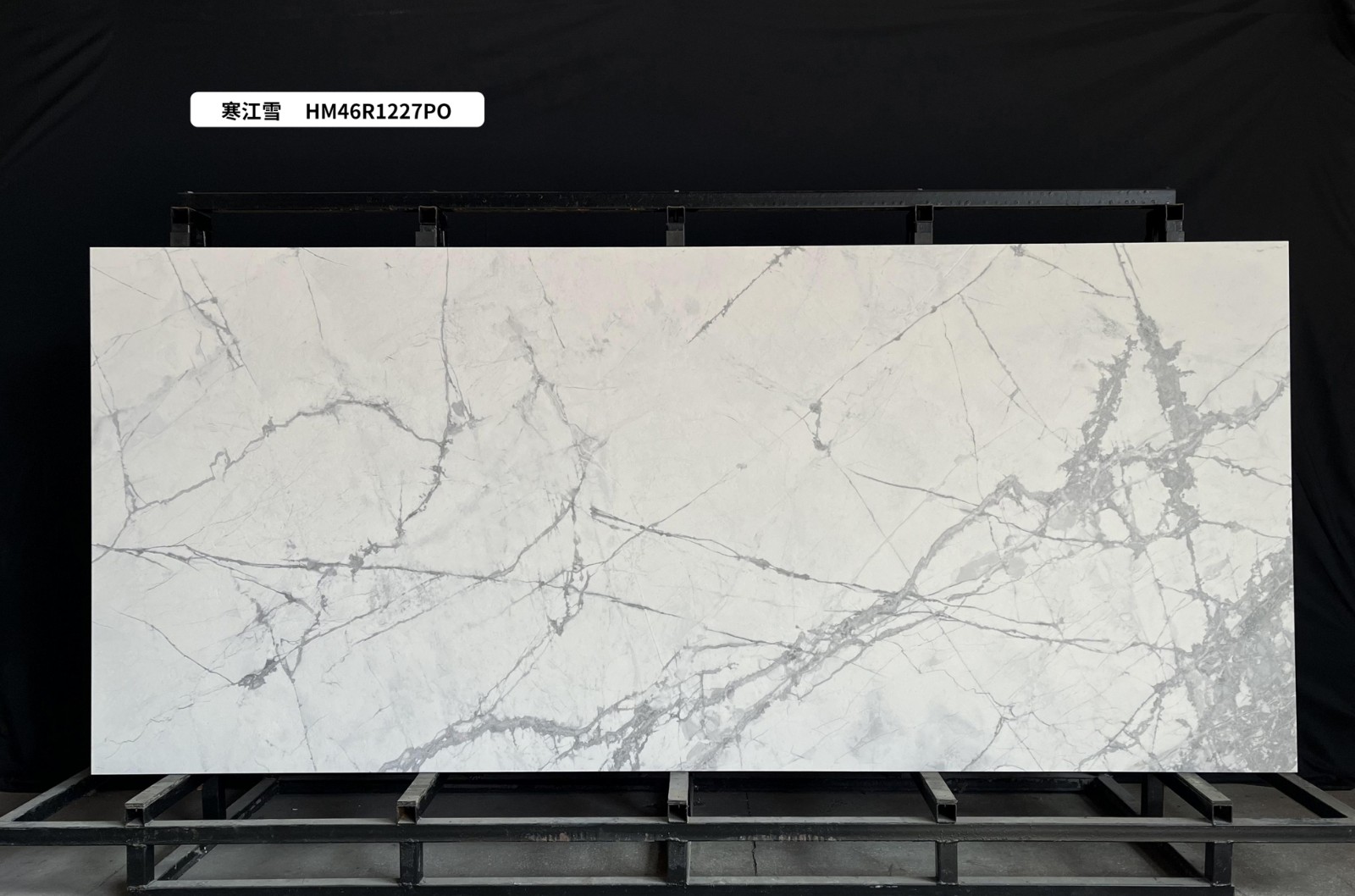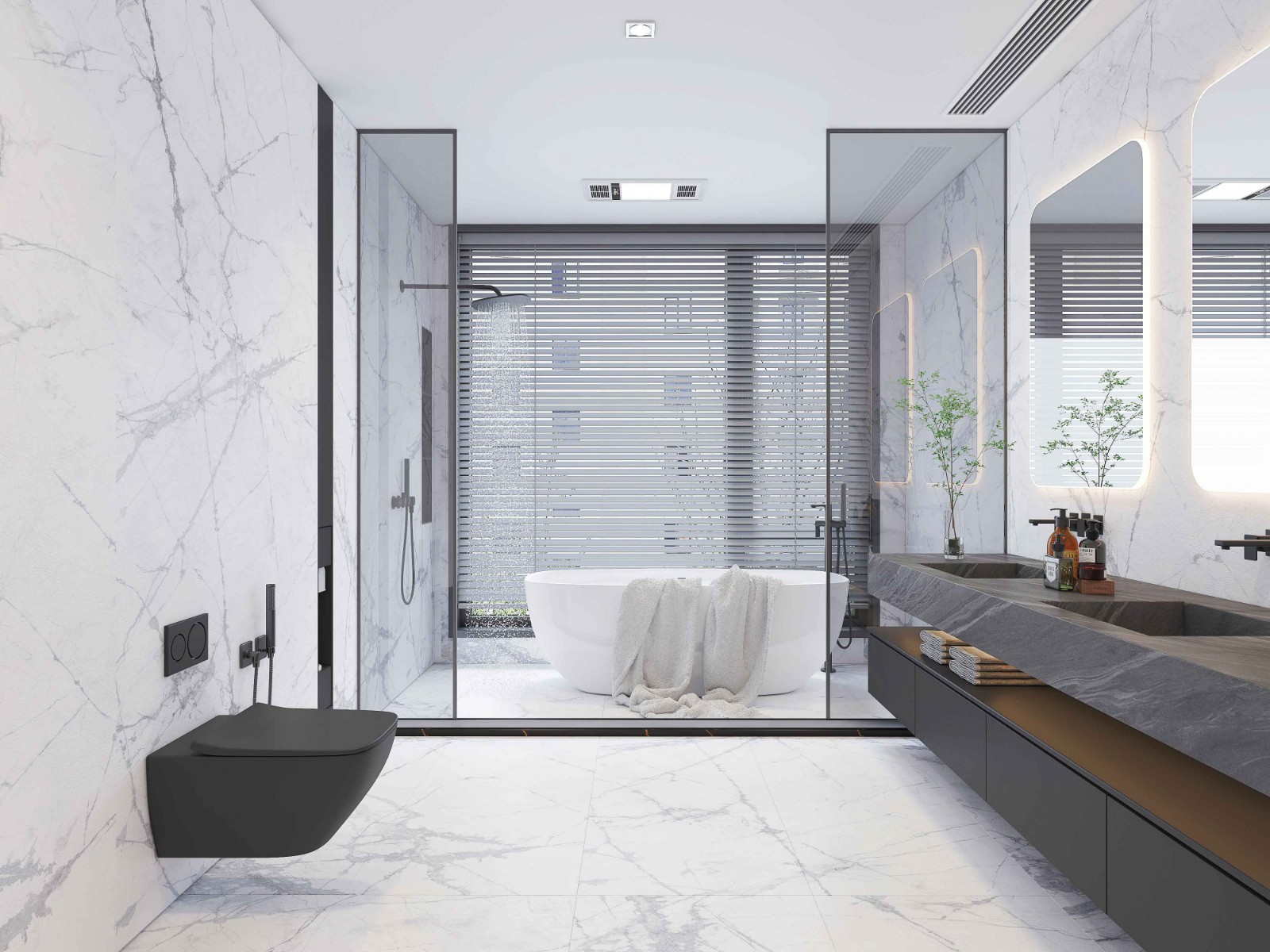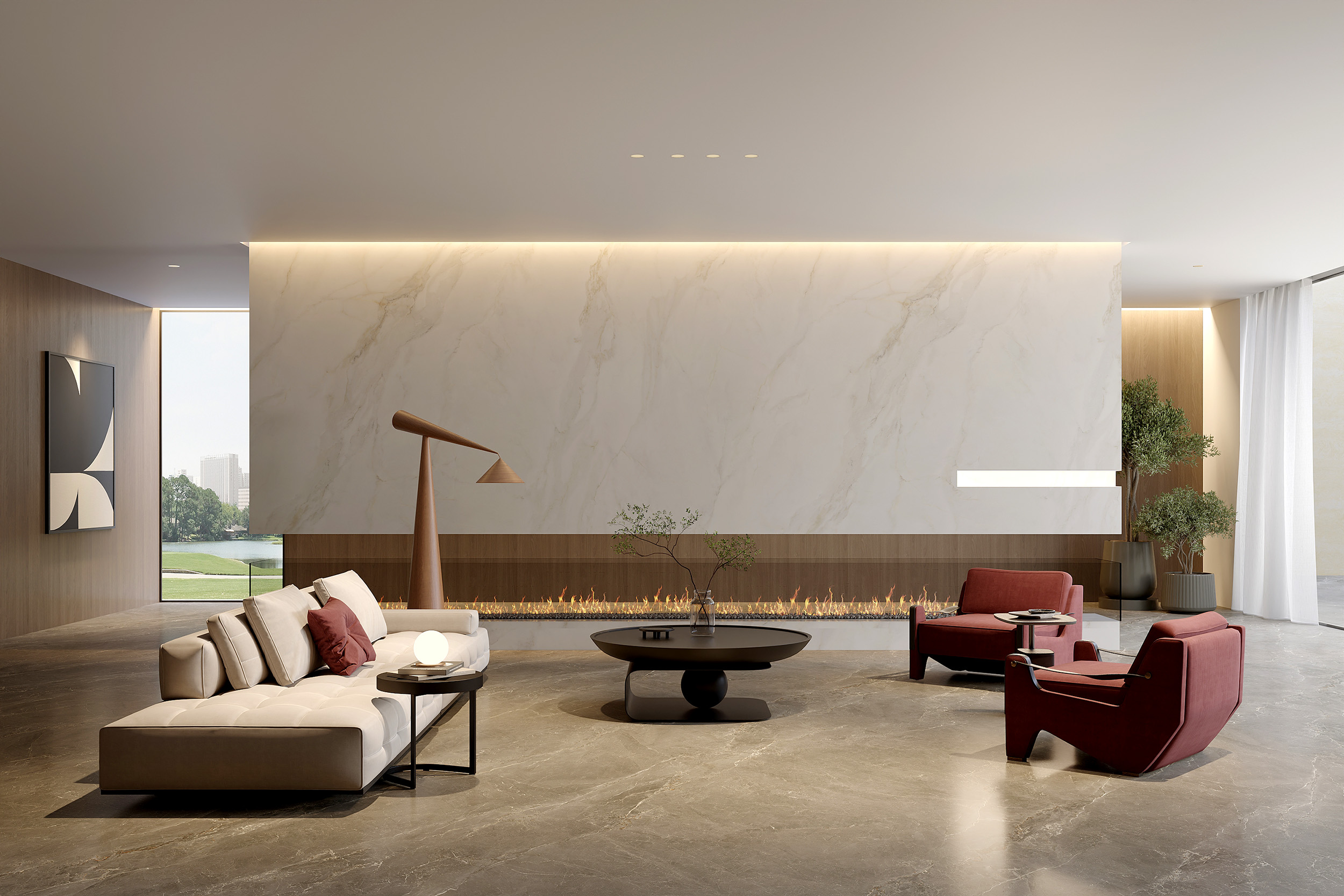In modern home renovations, the choice of kitchen and bathroom countertop material directly impacts the overall aesthetic, durability, and ongoing maintenance costs of the space. Quartz countertops and imitation marble countertops are two of the most popular decorative materials on the market. Their distinct material properties and performance make them top considerations for consumers when choosing countertops.
So, how do you choose between quartz countertops and imitation marble countertops? This article provides a comprehensive and in-depth analysis of material characteristics, physical properties, lifespan, maintenance methods, price comparisons, and aesthetics, offering professional guidance.

What are quartz countertops?
Quartz countertops are a man-made stone made primarily from natural quartz, processed under high temperature and high pressure. Their core composition typically consists of approximately 90%-95% natural quartz, supplemented with a small amount of resin and pigment. Through rigorous mixing and pressing, they create a quartz slab with a high hardness and dense structure. Quartz countertops have a highly uniform material structure, which gives them significant advantages in terms of wear, scratch, and stain resistance.
In terms of physical properties, quartz countertops have a hardness of 7 on the Mohs scale, far exceeding that of common man-made panels and some natural marbles, resulting in a hard and impact-resistant surface. Furthermore, the non-porous structure of quartz countertops effectively prevents moisture penetration, making them less susceptible to bacterial growth, making them suitable for kitchen countertops. In terms of color and texture, quartz countertops can be customized with pigments during the production process, allowing for a variety of designs, from solid colors to simulated stone patterns, to meet individual consumer needs.
What are imitation marble countertops?
Imitation marble countertops, also known as artificial marble stone countertops, are primarily made from natural stone powder, resin, and pigments, and are cast or pressed into molds. Their key advantage lies in their ability to mimic the texture and color of natural marble, while offering greater flexibility during processing and installation. Compared to natural marble, imitation marble countertops are lighter, easier to cut and install, and generally more economical.
While imitation marble countertops are beautiful, their hardness typically ranges from 3 to 5 on the Mohs scale, making them softer than quartz countertops and offering limited scratch resistance. Their surfaces are often polished, so their stain and water resistance depends on the resin content and processing technique. A high resin content enhances the countertop's resistance to water, acids, and alkalis, but scratches and discoloration may still occur with long-term use.

Quartz Countertops vs. Imitation Marble Countertops: Physical Properties Comparison
When choosing a countertop material, physical properties are crucial indicators of suitability. Quartz countertops and imitation marble countertops differ significantly in terms of hardness, temperature resistance, scratch resistance, and stain resistance.
1. Hardness and Scratch Resistance
Quartz countertops, due to their high quartz content, can achieve a hardness of 7 on the Mohs scale, making them resistant to everyday kitchen use, including scratches from knives and heavy impacts. In contrast, imitation marble stone countertops have a lower hardness and are easily scratched by metal utensils or sharp objects. Quartz countertops offer a distinct advantage in durability for kitchens subject to prolonged use and frequent contact with knives.
2. Heat Resistance
Kitchen countertops frequently come into contact with hot pots and baking sheets, so heat resistance is a key performance characteristic. Quartz countertops can withstand short bursts of high temperatures, but prolonged exposure to high temperatures may cause discoloration or micro-cracking of the resin. Imitation marble countertops have relatively poor heat resistance and may partially melt or deform if placed directly on hot objects. Therefore, quartz countertops offer more reliable overall performance in kitchen environments.
3. Stain and Water Resistance
Quartz countertops have a dense, non-porous surface, making them impervious to water. They easily clean everyday stains and are less susceptible to bacterial growth. While imitation marble countertops are polished, they still have micro-pores. Prolonged contact with oil, juice, coffee, and other acidic liquids may cause staining or contamination, requiring more frequent cleaning and maintenance.
4. Abrasion Resistance
Quartz countertops offer excellent wear resistance, making them suitable for long-term, intensive use. However, the resin layer of imitation marble countertops is susceptible to wear and tear, and their gloss may fade with long-term use. For homes that want long-lasting countertop beauty, quartz countertops are clearly the ideal choice.
Quartz Countertops vs. Imitation Marble Countertops: Aesthetics and Design Compatibility
The aesthetics of a countertop directly impact the overall visual impact of a home. Quartz countertops and imitation marble stone countertops each offer advantages in terms of visual appeal and design flexibility.
1. Design Features of Quartz Countertops
The color and texture of quartz countertops can be adjusted through the production process, allowing for a pure, minimalist look or to simulate the texture of natural stone. Its uniform surface and stable color make it suitable for a variety of decor styles, including modern minimalist, industrial, and Scandinavian. Quartz countertops have a relatively uniform texture, making them ideal for homes that prefer a clean, understated aesthetic.
2. Design Features of Imitation Marble Countertops
The most significant advantage of imitation marble stone countertops is their highly realistic texture of natural marble. With rich colors and natural grain, each countertop is unique, adding a sense of luxury and artistic flair to any space. Imitation marble stone countertops are particularly appealing to homes seeking visual impact and a high-end feel.
Quartz Countertops vs. Imitation Marble Countertops: Installation and Processing Compatibility
Quartz countertops and imitation marble countertops differ in their adaptability during processing and installation.
1. Quartz Countertops
Quartz countertops are relatively hard, requiring specialized equipment and techniques for cutting and drilling, resulting in relatively high installation costs. Their weight requires sturdy cabinet support, and the installation process must be carefully controlled to avoid breakage. Despite the higher installation cost, once installed, quartz countertops offer exceptional stability and durability.
2. Imitation Marble Countertops
Imitation marble countertops are lightweight, easy to cut and process, and suitable for kitchen or bathroom countertops of various sizes and shapes. The installation process is simple and can be flexibly adjusted to site conditions. Because the material is softer, the risk of damage during installation is lower, and the overall installation period is shorter, making them suitable for homes with tight renovation deadlines.

Quartz Countertops vs. Imitation Marble Countertops: Care and Maintenance
How you care for countertop materials directly affects their lifespan and aesthetics.
1. Quartz Countertop Maintenance
Quartz countertops are relatively easy to maintain; daily cleaning can be done with water or a neutral detergent. They are non-absorbent and highly stain-resistant, maintaining their luster even after prolonged use. Avoiding direct contact with strong acids or high-temperature materials will extend the lifespan of the countertop. Furthermore, quartz countertops do not require regular waxing or glazing, making them low-maintenance.
2. Imitation Marble Countertop Maintenance
Although imitation marble countertops are beautiful, they require higher cleaning and maintenance requirements. Avoid scratches with sharp objects and wipe them regularly with a neutral detergent. Also, be careful to avoid prolonged contact with high temperatures or acidic or alkaline liquids. Long-term use may require re-waxing or polishing to maintain the surface luster. Overall, imitation marble countertops are more expensive and labor-intensive to maintain.
Quartz Countertops vs. Imitation Marble Countertops: Price Comparison and Cost-Effect Analysis
Quartz countertops are generally more expensive than imitation marble stone countertops due to their complex production process and high material costs. Prices vary depending on brand, thickness, and processing, generally ranging from several hundred to several thousand yuan per square meter. Imitation marble stone countertops have low raw material costs, are relatively simple to process, and are more affordable, typically costing only a few hundred yuan per square meter.
In terms of cost-effectiveness, if durability, scratch resistance, and low maintenance are key, quartz countertops, while requiring a higher initial investment, offer better long-term value. Imitation marble countertops, on the other hand, have a lower initial investment and are aesthetically pleasing, but they also have higher long-term maintenance costs and lack both hardness and durability.

Quartz Countertops vs. Imitation Marble Countertops: Purchasing Recommendations
Based on material characteristics, physical properties, aesthetics, processing and installation suitability, and maintenance costs, quartz countertops and imitation marble countertops each have their own advantages:
1. Quartz countertops are suitable for homes seeking high durability, low maintenance, and a modern, minimalist style. Their high hardness, scratch resistance, stain resistance, and water resistance make them suitable for long-term use in kitchens and bathrooms.
2. Imitation marble stone countertops are suitable for those seeking the beauty of natural textures, lightweight installation, and a limited budget. Their natural texture, rich colors, and ease of processing, however, are less hard and durable, requiring more careful maintenance.
Therefore, when purchasing, consider your family's needs, environment, and budget. If your kitchen is frequently used, a quartz countertop offers greater reliability; if you're seeking visual impact and a luxurious feel, a faux marble stone countertop offers greater appeal. Through professional analysis and rational judgment, consumers can choose the countertop material that best suits their needs, achieving the optimal balance between functionality and aesthetics.
Why are WOWSLAB marble slabs considered high-quality?
WOWSLAB manufactures marble slabs and sintered stone slabs using advanced techniques and high-quality raw materials. Our factory in China ensures consistent production, meeting strict aesthetic and physical performance standards. Buyers can purchase wholesale or single slabs, access competitive prices, discounts, and promotions, and request detailed quotes tailored to their projects.


